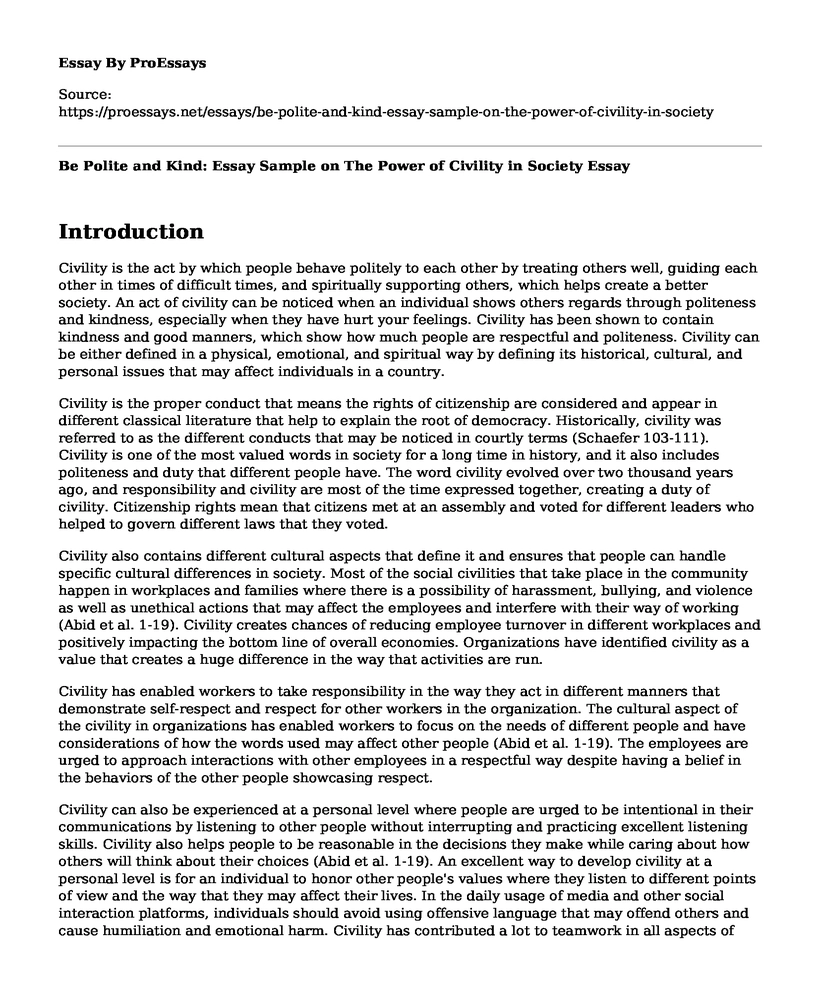Introduction
Civility is the act by which people behave politely to each other by treating others well, guiding each other in times of difficult times, and spiritually supporting others, which helps create a better society. An act of civility can be noticed when an individual shows others regards through politeness and kindness, especially when they have hurt your feelings. Civility has been shown to contain kindness and good manners, which show how much people are respectful and politeness. Civility can be either defined in a physical, emotional, and spiritual way by defining its historical, cultural, and personal issues that may affect individuals in a country.
Civility is the proper conduct that means the rights of citizenship are considered and appear in different classical literature that help to explain the root of democracy. Historically, civility was referred to as the different conducts that may be noticed in courtly terms (Schaefer 103-111). Civility is one of the most valued words in society for a long time in history, and it also includes politeness and duty that different people have. The word civility evolved over two thousand years ago, and responsibility and civility are most of the time expressed together, creating a duty of civility. Citizenship rights mean that citizens met at an assembly and voted for different leaders who helped to govern different laws that they voted.
Civility also contains different cultural aspects that define it and ensures that people can handle specific cultural differences in society. Most of the social civilities that take place in the community happen in workplaces and families where there is a possibility of harassment, bullying, and violence as well as unethical actions that may affect the employees and interfere with their way of working (Abid et al. 1-19). Civility creates chances of reducing employee turnover in different workplaces and positively impacting the bottom line of overall economies. Organizations have identified civility as a value that creates a huge difference in the way that activities are run.
Civility has enabled workers to take responsibility in the way they act in different manners that demonstrate self-respect and respect for other workers in the organization. The cultural aspect of the civility in organizations has enabled workers to focus on the needs of different people and have considerations of how the words used may affect other people (Abid et al. 1-19). The employees are urged to approach interactions with other employees in a respectful way despite having a belief in the behaviors of the other people showcasing respect.
Civility can also be experienced at a personal level where people are urged to be intentional in their communications by listening to other people without interrupting and practicing excellent listening skills. Civility also helps people to be reasonable in the decisions they make while caring about how others will think about their choices (Abid et al. 1-19). An excellent way to develop civility at a personal level is for an individual to honor other people's values where they listen to different points of view and the way that they may affect their lives. In the daily usage of media and other social interaction platforms, individuals should avoid using offensive language that may offend others and cause humiliation and emotional harm. Civility has contributed a lot to teamwork in all aspects of life, from class to competitions to work because it helps to bind the team together and ensure that they work to produce effective results.
Conclusion
Civility is a dynamic behavior of individuals that acts as a sign of respect to other people, which makes them feel appreciated and serves as a contributor to the connection and collaboration of teams. It has also enabled workers to take responsibility in the way they work, and this helps to demonstrate self-respect and respect for other workers in the organization. Civility is discussed in personal, cultural, and historically where it was experienced from many decades ago.
Works Cited
Abid, Ghulam, et al. "The influence of prosocial motivation and civility on work engagement: The mediating role of thriving at work." Cogent Business & Management 5.1 (2018): 1-19.
Schaefer, Larry. "History and Civility." NAMTA Journal 40.1 (2015): 103-111.
Cite this page
Be Polite and Kind: Essay Sample on The Power of Civility in Society. (2023, Mar 12). Retrieved from https://proessays.net/essays/be-polite-and-kind-essay-sample-on-the-power-of-civility-in-society
If you are the original author of this essay and no longer wish to have it published on the ProEssays website, please click below to request its removal:
- How Have Cell Phones Changed Communication?
- Race and Gender in Video Games Paper Example
- Essay on Contemporary Parents: Building Autonomy & Healthy Eating Habits in Adolescents
- New York City: A Vibrant and Busy Metropolis - Essay Sample
- Race, Blackness & European Colonialism - Essay Sample
- Paper on Peer Relationships: A Guide to Social-Emotional Enhancement
- Free Report Example on Men's Fertility & Fatherhood







